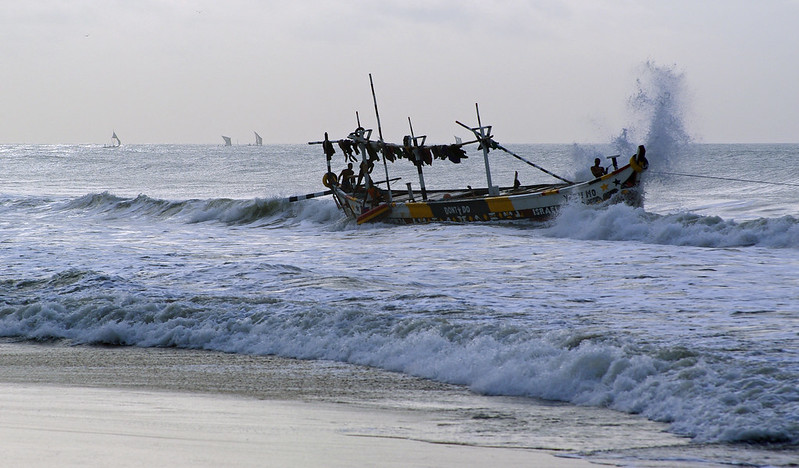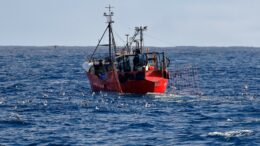After 20 years of discussion, the World Trade Organization has reached an agreement on fishing subsidies. It states that all members should eliminate harmful subsidies contributing to illegal, unreported and unregulated fishing, and the overfishing of at-risk fish populations. It also requires annual reviews on each nation’s progress on implementation and operations.
This required a difficult consensus of the 164 member states, making the agreement an important step forward. But there are still key loopholes and exceptions that must be ironed out for the agreement to be successful. And any agreement is only as good as its implementation.
According to the UN Food and Agriculture Organization, more than 35% of our world’s fish population has been overfished, and that percentage is only rising. Meanwhile around $22 billion was spent in 2018 on subsidies — public funding to make fisheries more profitable — to increase fishing capacity. In many cases fish populations have been so heavily exploited that fishing vessels rely on the distorting effect of subsidies to turn a profit; one expert analysis puts the figure at over half of current high-seas fishing grounds.
For too long these subsidies have devastated marine wildlife, local livelihoods and food security around the world. Fish are a vital source of protein in least-developed countries. As they are overexploited, vulnerable coastal communities are left at risk of starvation; more than half of the small-scale fishers that my organization, the Environmental Justice Foundation, recently interviewed in Ghana reported going without sufficient food in the past year.
An open letter from the Ghana National Canoe Fishermen’s Council says that if illegal fishing — driven in part by harmful fisheries subsidies — isn’t addressed, “the source of income for over 2.7 million Ghanaians will be lost.”
Small-scale fishers deserve a fair playing field. Once all harmful subsidies are removed, alongside increased transparency and enforcement of regulations to end overfishing, they have a chance to be part of a sustainable global fishing network.
Industrial Trawling
Experts estimate that 81% of governments’ fisheries subsidies benefit large industrial fleets, distorting access to marine resources and destroying the heart of many coastal communities. In Africa twice the amount of subsidies from foreign nations goes toward distant water vessels to fish off the African coast than goes to African vessels themselves.
Shamefully, wealthy countries have been directly funding wasteful overfishing and illegal fishing at the expense of small-scale fishing communities. This WTO agreement means we can give fishing communities a chance of survival and begin the end of this clear injustice.
However, this deal is just the start of the shift we need toward a more sustainable fishery sector. Harmful fisheries subsidies aren’t limited to those that prop up illegal fishing or overcapacity. At the moment prohibitions on fuel subsidies — 22% of all fisheries subsidies — have been left out of the text, meaning that there’s still work to be done to restore a truly thriving ocean.

Blue Carbon and the Climate Crisis
This agreement is good news for the climate, too, as the ocean is the world’s largest carbon sink. Around 43.5% of the carbon in marine life like fish — so-called “blue carbon”— extracted from the high seas comes from areas that would be unprofitable to fish without financial support, so we have been driving ocean ecosystems to collapse and speeding up the climate crisis with the same set of subsidies.
For every degree Celsius of warming, global fisheries catch potential will fall by more than 3 million metric tons. These impacts will predominantly be felt by equatorial countries, many of them low-income, where their annual catches will fall by half. This means that ending some of these subsidies for good protects our climate, ocean and peoples’ food security and livelihoods with one stroke of the pen.
Implementation
It’s clear that this agreement has the potential to bring an opportunity for our over-exploited oceans to recover, but at present it relies too heavily on self-reporting from subsidizing member countries, with no binding enforcement measures or mechanism to ensure countries follow through.
All countries must implement the agreement as well as go beyond it, by urgently reflecting this decision in their domestic regulations and removing all harmful subsidies — not just those covered in the agreement — ensuring transparency throughout the process. The European Union and the United States — which both have strong commitments to fight illegal, unreported and unregulated fishing globally – should move quickly and lead by example in removing harmful subsidies from their fleets. But every nation can and must go faster and further than this agreement for a truly sustainable ocean.
At present, subsidies will be limited for at least the next four years as negotiations to expand the reach of this agreement will continue for the duration. We don’t have four more years to continue at this pace — we need quick, joint action from the international and national levels. While the WTO must speed up negotiations to expand the agreement’s remit and make it binding, national governments must also go beyond what the WTO mandates and use their powers to drive sweeping change in both policy and action.
Two key additional aspects will be ending fuel subsidies and addressing subsidies that support fishing overcapacity, which allows fishers to go beyond sustainable catch levels. The latter is mentioned in the agreement, but no comprehensive deal was made. Both international and national actors must include fuel subsidies and fishing overcapacity in their agreements and policies, as well as take more immediate action toward implementing it.
It has taken two decades for the WTO to take meaningful action on ending subsidies for overfishing. We can’t afford to take this long to implement this agreement. If fishing nations take action now and cut the flow of finance to illegal fishing, overfishing and overcapacity, we can drive real progress toward a secure and sustainable future for the ocean and the people who depend on it.
The opinions expressed above are those of the author and do not necessarily reflect those of The Revelator, the Center for Biological Diversity or their employees.
![]()
Previously in The Revelator:
Outlaw Oceans: Exposing Slavery, Overfishing and Other Abuses on the High Seas


